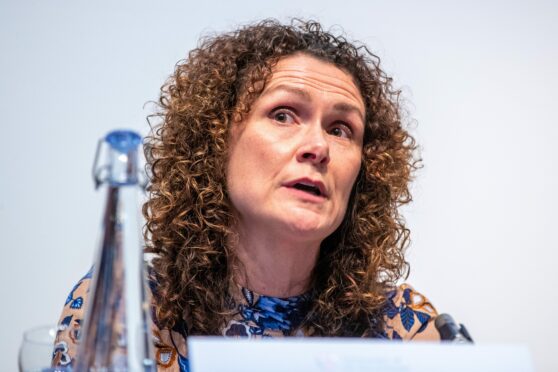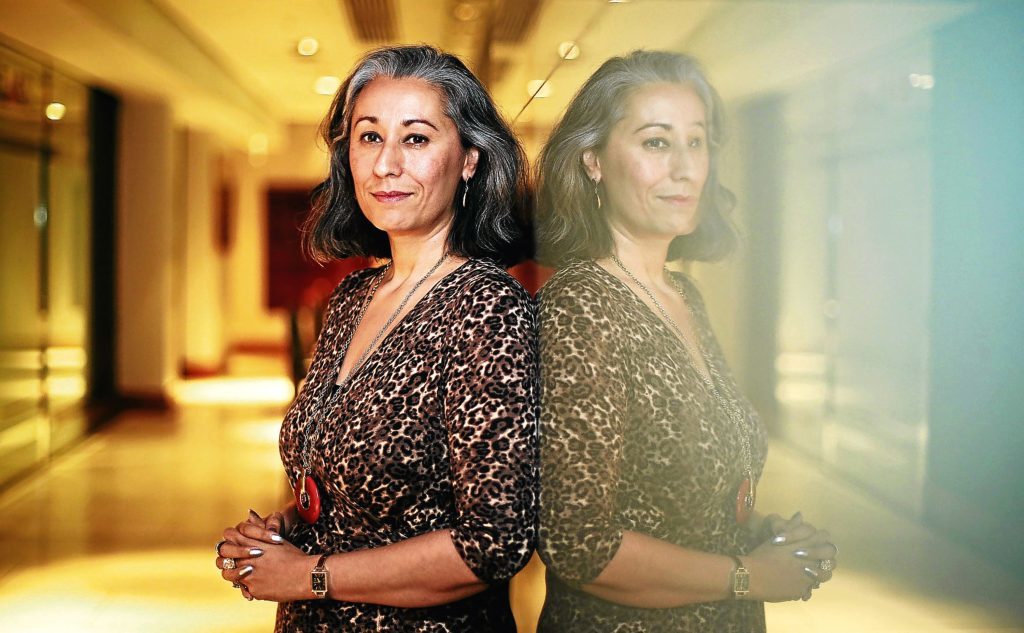
A police culture allegedly poisoned by bullying, sexism and misogyny should
be investigated by a Royal Commission, according to the only woman MP who has ever served as an officer.
Wendy Chamberlain believes a commission is the only way to investigate claims of sexism within the police as part of a wider inquiry into male violence against women and girls.
She said the corporate cultures of Police Scotland and other UK forces must be examined to ensure sexism is not undermining the prosecution of violent men.
The MP, who was an officer for 12 years, said: “I believe the way forward is to have a Royal Commission.”
Her inquiry call comes as we reveal details of how 17 allegations of criminal behaviour and neglect of duty involving officers stationed at Forres, where there were claims of a “boys’ club” culture, were dismissed by police and prosecutors. One officer was allowed to transfer to England after being accused of domestic abuse and stalking his former partner.
The murder of Sarah Everard by a serving police officer, who had raised a number of red flags during his career in Kent, has placed renewed focus on whether sexism within the police and prosecution services is undermining effective action against male violence.
“Very little appears to have changed or has been learned”
Chamberlain, the Lib Dem MP for North East Fife, said a number of reviews into the corporate culture of Police Scotland, including a damning review by former Lord Advocate Dame Elish Angiolini last year, has failed to trigger significant change.
The politician, who joined Lothian and Borders police in 1999 before leaving 12 years later to pursue her career in politics, said: “I’m dismayed that, despite reports and reviews such as those from Dame Eilish Angiolini, very little appears to have changed or has been learned. A Royal Commission should now consider the issue of violence against women and girls to ensure that the corporate cultures of police forces across the UK, including Scotland, is included in that.”
Her call for a commission, an investigatory committee set up by the UK Government to examine issues of national importance, came after a former assistance chief constable, Angela Wilson, called for a judge-led inquiry into the corporate culture at Police Scotland led by Chief Constable Iain Livingstone. Yesterday, he signalled that he intended to seek another four-year term and lead the force until 2025.
The national force was recently severely criticised by an industrial tribunal that backed Rhona Malone, a former firearms officer, who claimed she had been victimised and hounded from her job after complaining about the sexism of a more senior officer.
Chamberlain said: “The vast majority of officers join because they want to do good and they feel dreadfully let down when they learn of cases like Rhona Malone’s and now this situation in Forres. We need to understand what went wrong.
“The process must be transparent and supportive of those who do come forward with concerns about other officers or a culture that is unacceptable. This is even more important when we have a single force, as we do in Scotland. I support the current calls for change.
“There is a lack of transparency around misconduct proceedings that I think many people find difficult to understand. The cases being highlighted here show continued concern over the handling of misconduct proceedings within Police Scotland as well as over the governance of policing.
“In 2019 Susan Deacon resigned as chair of the Scottish Police Authority, saying the structures were fundamentally unworkable. I’ve seen nothing to suggest anything has changed.”
Another former member of the Scottish Police Authority, Moi Ali, said how the allegations raised in the Forres case were investigated raises serious questions.
Ali, who has called for more transparency on public bodies, has also raised concerns that officers in Scotland can retire with their pensions intact while misconduct investigations are still under way.
She said: “In England and Wales, if there’s a gross misconduct investigation going on, steps are taken to prevent retirement until inquiries are concluded. That is not the case in Scotland and we have to change that.”
Ali also hit out at the lack of domestic abuse protection for women whose partners are serving officers. A recent Women’s Centre For Justice report revealed hundreds of partners of serving officers were living in fear and unable to trust the police will robustly investigate.
Ali said: “It’s clear women in Scotland have fewer protections if their partners are police officers. It’s deeply disturbing. What we need is a truly independent specialised unit which can operate to investigate cases like these so victims can trust they will get justice.
“At the present time there is concern that there is no truly independent governance or oversight with many of the organisations set up to do that containing former police officers. There’s little point in bringing in an outside force to do this job because the public have clearly lost confidence and trust in that process.”
New report
Last week a report by Her Majesty’s Inspectorate of Constabulary (HMIC) in Scotland reported that there had been 542 responses from officers about Police Scotland and some alleged being sexually assaulted.
More than a third of women alleged they had suffered discrimination and almost a third said they had been harassed.
The watchdog report found the force had a “culture driven by fear and misogyny”, and, although there were changes for the better, there was a “boys’ club” of “white middle-aged men”.
It comes after a report last year by Angiolini called for 80 changes after finding racism, sexism and homophobia in the force.
Ali said: “We know what needs to be done. Now we need action from the justice secretary. I suggested a tracker to be made available so the public could see just what progress has been made since Dame Angiolini’s review and 81 recommendations.”
The latest HMIC report told how women officers felt overlooked for promotions and were undervalued. One woman said: “I have been sexually assaulted at work, as have most female colleagues I have spoken to. I have also spent years being on the receiving end of sexist ‘jokes’ and banter, been asked questions regarding what sexual practices I take part in. I have also been told I have only received promotions due to being a female, and likewise been asked if I have performed sexual favours in order to get specific jobs/posts.”
The inspection found evidence of genuine commitment by senior officers to ensure the service is welcoming and inclusive but found fewer signs the leadership message was being translated into action.
Deputy Chief Constable Fiona Taylor said: “This report recognises our commitment to building a service with a culture founded on our values so that we better reflect, represent and serve the public. We know through engagement with our own staff associations that there is much work to be done.”
She said the recommendations of the Angiolini Report were being put into place and an external force will review the findings of the industrial tribunal into Rhona Malone’s treatment.
She added: “Police Scotland demands the highest levels of integrity from our officers and staff and when someone fails to meet this standard we take the appropriate action.
“We’re bringing additional focus to ensure our culture is welcoming and inclusive, including additional, independent scrutiny and oversight by an Independent Review Group, the membership of which have experience of advocating for underrepresented communities and of delivering equality and diversity outcomes across society.”
How five officers were cleared of 17 serious claims
In a letter to the whistle-blowing officer, the Crown Office said there would be no prosecution on 17 of her allegations after police and prosecutors investigated and reviewed evidence.
OFFICER A
VANDALISM
The view was reached that there was insufficient evidence
ASSAULT
Insufficient evidence
STALKING
Cannot be proved
OFFICER B AND OFFICER C
ASSAULT ON A WOMAN
Insufficient evidence
THREATENING BEHAVIOUR
Did not amount to a crime
ASSAULT ON A MAN
Insufficient evidence
THREATENING A COLLEAGUE
Insufficient evidence
ASSAULT ON A MAN
Insufficient evidence
UNLAWFUL ARREST
Insufficient evidence.
ABANDONED A COLLEAGUE IN WOODS
Did not amount to a crime
OFFICER D AND OFFICER E
SEXUAL ASSAULT ON A COLLEAGUE
Insufficient evidence
SEXUAL COMMENTS TO A COLLEAGUE
Insufficient evidence
ASSAULT ON A COLLEAGUE
Insufficient evidence
SENDING OBSCENE MESSAGES
Insufficient evidence
STALKING A COLLEAGUE
Did not amount to a crime
FAILURE TO INVESTIGATE
Insufficient evidence
ENTERING FALSE DATA INTO LOGS
Insufficient evidence.

Enjoy the convenience of having The Sunday Post delivered as a digital ePaper straight to your smartphone, tablet or computer.
Subscribe for only £5.49 a month and enjoy all the benefits of the printed paper as a digital replica.
Subscribe
